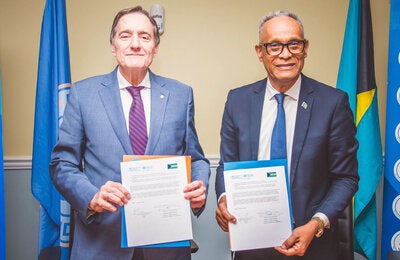

Making cities and communities age-friendly is one of the most effective policy approaches for ensuring a healthier ageing...
 Making cities and communities age-friendly is one of the most effective policy approaches for ensuring a healthier ageing process that will positively contribute to economic development, while reducing the burden of health care costs, said PAHO Deputy Director, Dr. Jon Andrus, on April 4, at AARP launch of its Network of Age-Friendly Communities across the United States.
Making cities and communities age-friendly is one of the most effective policy approaches for ensuring a healthier ageing process that will positively contribute to economic development, while reducing the burden of health care costs, said PAHO Deputy Director, Dr. Jon Andrus, on April 4, at AARP launch of its Network of Age-Friendly Communities across the United States.
"Involve older people as full partners at all stages", he said. "In the follow-up stages of 'age-friendly' local action, it is imperative that older people continue to be involved in monitoring the city's progress and acting as age-friendly city advocates and advisers".
In affiliation with the World Health Organization (WHO), AARP launched The AARP Network of Age-Friendly Communities, which aims to provide a system to educate, encourage, promote, and recognize improvements that make cities, towns, and counties more user-friendly for older residents.
The network is affiliated with the World Health Organization's (WHO) Global Network of Age-Friendly Cities and Communities, an international effort to get cities and towns prepared for two significant ongoing trends: rapid population aging and increasing urbanization.
This launch came days before the celebration of World Health Day, this 7 April, which focus on healthy aging with the theme "good health adds life to years," in order to show how lifelong good health can contribute to a full and productive life in later years.
"PAHO and WHO recognize that the new challenges of aging requires a reorganization of international cooperation to tackle the new demands of older persons; thus, the integration of initiatives that facilitate effective, sustainable cooperation is absolutely critical, and certainly presents itself as a tremendous opportunity to accomplish more", Dr. Andrus said. He recognized the incorporation of AARP to the WHO initiative as a "substantial milestone".
The world is getting older, rapidly transitioning from a rural environment to an urban city environment and also dying more frequently of chronic diseases compared to infectious diseases, he said. But despite living longer, people are exercising less, eating more poorly, and abusing tobacco and alcohol, he added.
"Cities without access to proper food choices or parks to exercise are among the social determinants of health that require an all of society approach to prevent or reverse", Dr. Andrus said. "Older persons play a crucial role in communities - in paid or volunteer work, transmitting experience and knowledge, or helping their families with caring responsibilities. These contributions can only be ensured if older persons enjoy good health", Dr. Andrus said.
In 2012, AARP will pilot the network in seven states (Georgia, Iowa, Kansas, Michigan, New York, Oregon, and Pennsylvania) and the District of Columbia. AARP expects to expand the network to other states in the future. The pilot states in AARP's Network of Age-Friendly Communities will identify and support communities that want to improve the physical and social environments of the city or town's elders and help them remain healthy, active, and engaged in their communities for as long as possible.
Nancy LeaMond, Executive Vice President of AARP's State and National Group; Beth Osborne, Deputy Assistant Secretary of Transportation Policy at the U.S. Department of Transportation; Kathy Greenlee, Assistant Secretary for Aging at the U.S. Department of Health and Human Services; and Estelle Richman, Acting Deputy Secretary at the U.S. Department of Housing and Urban Development also participated in the launching event.
Links:



